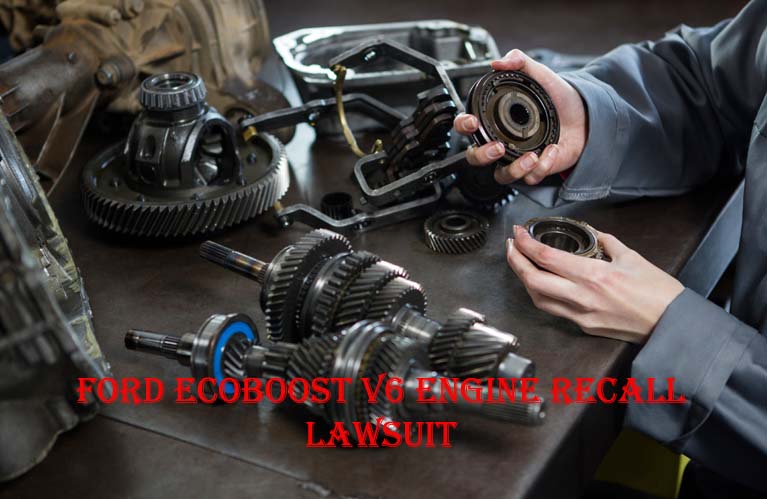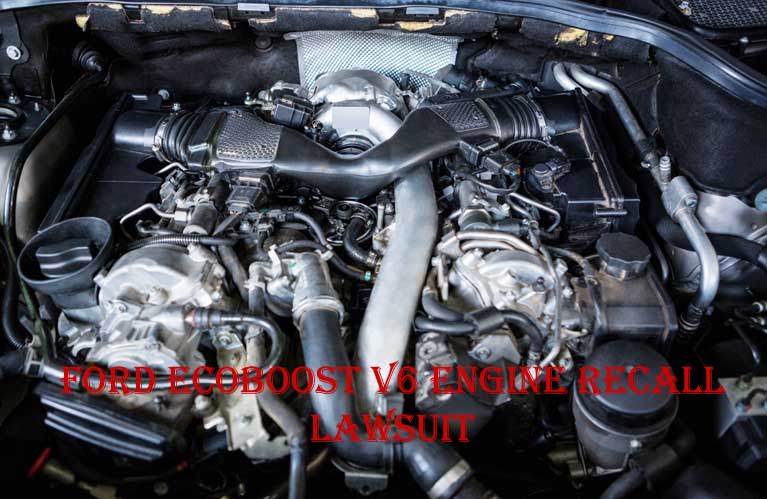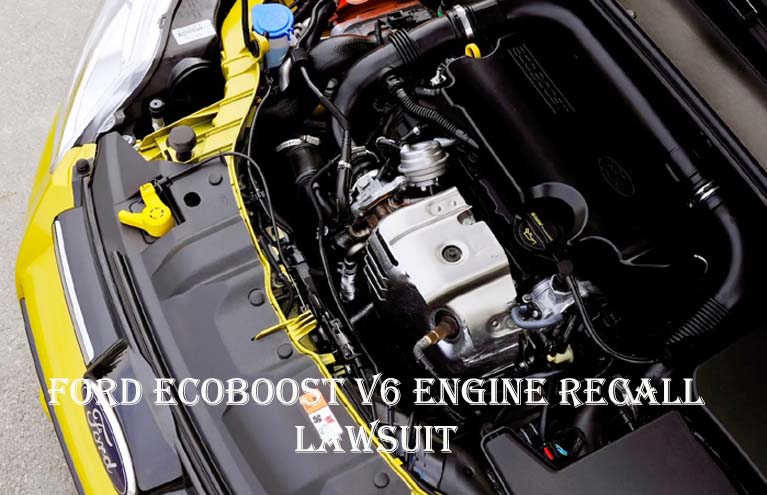So, you’re here. Chances are, you’re worried about your truck or SUV. Maybe you watched a scary cloud of white smoke pour out of your tailpipe. Or you keep filling up the coolant, but the level just keeps dropping. Then again, maybe you’ve already heard those dreaded words from your mechanic: “You need a new engine.”
Believe me, you are not alone.
A ton of Ford’s famous EcoBoost V6 engines are right at the center of a massive Ford EcoBoost V6 engine recall lawsuit, accused of a critical design flaw that can suddenly lead to complete engine failure. This isn’t some minor recall—it’s a deep-seated issue that’s left countless owners staring down repair bills that regularly shoot past $10,000.
Think of this guide as your go-to resource. We’re going to break down the Ford EcoBoost V6 lawsuit in simple terms. You’ll finally understand what’s going on, why it’s happening, and most importantly, what you can actually do about it.
A Quick Look: What You Need to Know
| The Problem | The Cause | The Response |
|---|---|---|
| Coolant leaks into the engine cylinders, causing misfires, smoke, and often total engine failure. | An alleged design flaw (often called a “porous block” or “faulty valves”) that allows coolant to intrude where it shouldn’t. | A class-action lawsuit, Torres v. Ford Motor Company, has been filed seeking compensation for affected owners. |
| The Models: Primarily F-150, Explorer, and other vehicles with the 2.7L or 3.5L V6 EcoBoost engine. | The Cost: Owners report engine replacement costs between $8,000 and $15,000. | The Goal: Reimbursement for repairs, extended warranty coverage, and a permanent fix from Ford. |
What is the Ford EcoBoost V6 Lawsuit About? (The “Why”)
So, what’s this all really about? The class action lawsuit against Ford hinges on one serious claim: that certain Ford EcoBoost V6 engines have a basic defect letting engine coolant leak into the cylinders.
This thing, called coolant intrusion, is an internal nightmare. You won’t spot a leak on your driveway. Instead, coolant sneaks into places it absolutely doesn’t belong—like the combustion chamber. When that happens, you can get anything from weird performance issues to a full-blown engine failure that demands a complete swap.
The Ford engine lawsuit claims Ford knew about these EcoBoost engine problems the whole time but never told consumers or came up with a real, permanent solution. The goal is to hold the automaker responsible and get back the huge financial losses owners have faced.

Affected Models: Is Your Ford Vehicle Included?
The Ford EcoBoost V6 engine recall lawsuit zeros in on vehicles with the 2.7L and 3.5L V6 engines. If you drive one of these models, you’ll want to pay attention.
The table below shows the vehicles and model years most often linked to the coolant intrusion issue.
| Vehicle Model | Affected Model Years (Approximate) | Engine Size |
|---|---|---|
| Ford F-150 | 2017 – 2022 | 3.5L EcoBoost V6 |
| Ford Explorer | 2016 – 2020 | 3.5L EcoBoost V6 |
| Ford Edge | 2.7L EcoBoost V6 | |
| Lincoln MKX | 2.7L EcoBoost V6 | |
| Lincoln Navigator | 3.5L EcoBoost V6 | |
| Lincoln Aviator | 3.5L EcoBoost V6 |
Here’s your first move: check your Vehicle Identification Number (VIN). Official recalls always depend on your VIN, which spells out your vehicle’s exact build. You can check your VIN on the official National Highway Traffic Safety Administration (NHTSA) recalls website.
7 Critical Symptoms of EcoBoost Coolant Intrusion
Wondering if your vehicle is affected? The signs of coolant intrusion can be subtle at first, then they get bad—fast. If you notice any of the following, it’s a major red flag for this known defect:
-
White Smoke from the Exhaust: This is a big one. Coolant burning off in the exhaust creates thick, white smoke—you’ll see it most at startup.
-
Unexplained Coolant Loss: If you’re always adding coolant but never see a puddle on the ground, it’s probably leaking into the engine.
-
Engine Overheating: Low coolant from an internal leak will quickly make your engine run way too hot.
-
Misfires or Knocking Sounds: Coolant in the combustion chamber messes everything up, leading to rough idling, shaking, and scary knocking noises.
-
Loss of Power: You might feel a huge loss of power, especially when you accelerate or are towing.
-
Hard Starting: A cylinder full of fluid makes it tough for the engine to turn over, so it cranks longer when you start it.
-
The Smell of Sweet Syrup: That distinct sweet smell of antifreeze might be inside or outside the car as it burns off.
If your Ford F-150 is smoking at startup or your Explorer is losing coolant, don’t brush it off. These are classic warning signs.
The Real-World Impact: Owner Experiences and Forum Stories
Behind all the technical talk, this Ford EcoBoost V6 engine recall lawsuit is about real people. A quick look through owner forums like Bronco6G reveals thousands of stories of pure frustration and financial stress.
-
One 2018 F-150 owner told the story of their truck dying on the highway, followed by a $13,000 estimate for a new engine—right after the powertrain warranty ended.
-
An RV owner shared their horror story: their Ford SUV, the tow vehicle, lost power while hauling a travel trailer on a mountain pass, creating a seriously dangerous situation.
-
So many people report multiple dealer visits for the same problem, only to be told to “just top up the coolant” instead of getting a real fix.
These stories show the real cost of this defect: it’s fear, frustration, and a total breakdown of trust in a brand people loved. It’s not just the money; it’s about safety and reliability.
Latest Update: Where the Class Action Lawsuit Stands Now (2025)
As of right now, the class action lawsuit against Ford (Torres v. Ford Motor Company) is still moving through the system. These legal things take time.
The case is in the discovery phase, where both sides are gathering evidence. We haven’t seen a proposed settlement yet. The Ford EcoBoost lawsuit isn’t just asking for money back for owners who paid for new engines; it’s also pushing Ford to create a real, lasting repair solution, like a dedicated extended warranty for this defect.
We’ll keep this section updated with any major news. For the absolute latest Ford EcoBoost lawsuit update, checking the court docket or trusted class-action legal sites is your best bet.

What to Do Next: A Step-by-Step Action Plan for Owners
Feeling overwhelmed? Don’t. Here’s a clear, step-by-step plan to protect yourself and your rights.
-
Document Everything: Grab a folder for your vehicle. Save every single repair order, invoice, and receipt for anything related to the cooling system or engine. Write down the dates and details of every symptom (“January 15: added coolant, no leak found”).
-
Check Your VIN & Contact Ford: Use the NHTSA VIN lookup tool to check for active recalls. Then, call Ford Customer Service at 1-800-392-3673 to open a case. Report your problem and give them your documentation. This gets it on the record.
-
File a Complaint with NHTSA: The National Highway Traffic Safety Administration needs consumer reports to investigate defects. Filing a complaint on their SaferCar.gov website is free and adds your voice to the pile—which could force an official recall.
-
Explore Your Legal Options: Look up the law firms handling the class action lawsuit to get a feel for the process. You usually don’t need to actively “join” a class action; if a settlement happens, it covers everyone. But, you could always file your own separate lawsuit.
Beyond the Lawsuit: Ford’s Response and Technical Service Bulletins (TSBs)
Everyone wants to know: “What is Ford actually doing about this?”
Over the years, Ford has put out various Technical Service Bulletins (TSBs) about engine performance and cooling troubles. TSBs are internal guides for dealership techs to diagnose common issues. While they acknowledge specific symptoms, they usually stop short of admitting a universal design defect.
Ford’s public stance has been to handle things case-by-case, sometimes through customer service programs or “goodwill” repairs for vehicles just outside of warranty. This inconsistent approach is a huge reason for the Ford EcoBoost V6 engine recall lawsuit, which wants a single, fair solution for every owner—not just the ones who make the most noise.
Frequently Asked Questions
Q: How do I join the Ford EcoBoost class action lawsuit?
A: Generally, you don’t have to “join.” If the lawsuit ends in a settlement, it should automatically cover everyone who owned the affected vehicles. Just keep an eye on the news for updates. Most class-action law firm websites will have info.
Q: Can the coolant intrusion problem be fixed permanently?
A: From what many owners and techs see, the only real permanent fix is a whole new engine with a redesigned long block that supposedly fixes the porosity issue. Smaller repairs often don’t last.
Q: Is my newer 2023 or 2024 model safe from this defect?
A: Ford hasn’t officially said the newer models have a redesigned engine. The class action lawsuit mainly focuses on model years up to 2022. I’d recommend keeping an eye on owner forums for any chatter about newer models.
Q: What is the average Ford EcoBoost engine replacement cost?
A: Owners keep reporting costs between $8,000 and $15,000 for a full engine replacement. It really depends on your model and local labor rates.
Conclusion: Ensuring Your Voice is Heard
Dealing with a massive mechanical failure is incredibly stressful. If you’re facing Ford EcoBoost V6 engine problems, understand this: it’s not your fault. And you are not alone. Thousands of owners are right there with you.
The best thing you can do is take action. Document your issue, report it to Ford and NHTSA, and stay in the loop. Your voice matters and helps push for a fair solution for everyone.
We’re keeping a close eye on this story and will update this guide with the latest news on the Ford EcoBoost engine recall lawsuit.
Disclaimer: This article is for informational purposes only and does not constitute legal or professional mechanical advice. The information is provided in good faith, however, we make no representation or warranty of any kind, express or implied, regarding the accuracy, adequacy, or completeness of the information. For specific advice regarding your vehicle or legal rights, please contact a qualified mechanic or an attorney specializing in class action lawsuits.
You May Also Like: CP4 Fuel Pump Silverado Sierra Lawsuit

